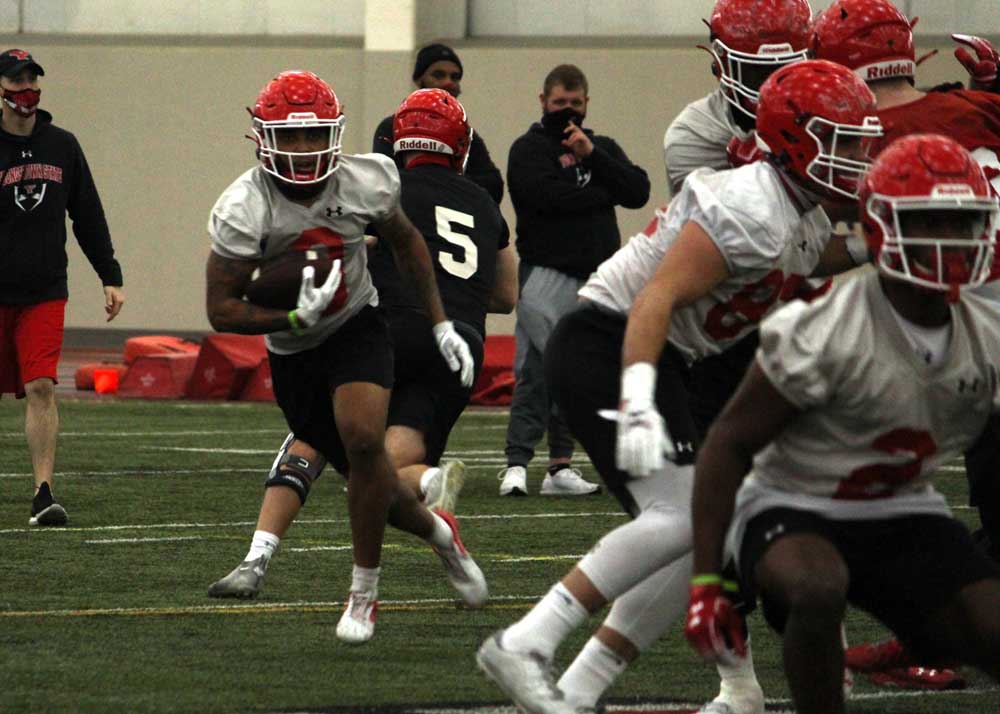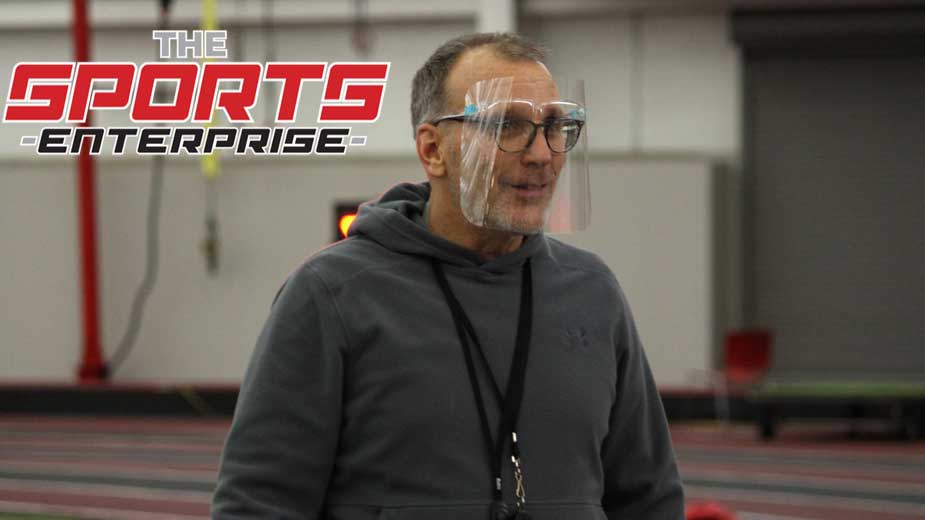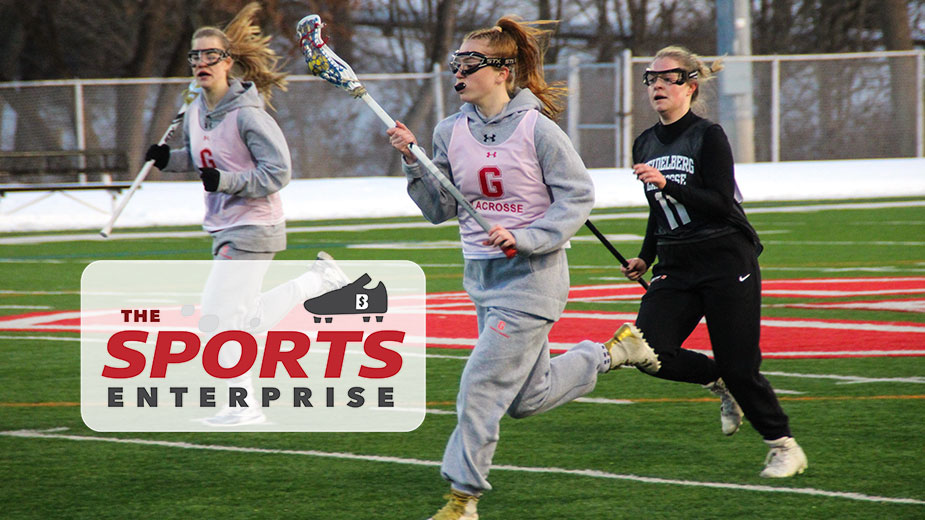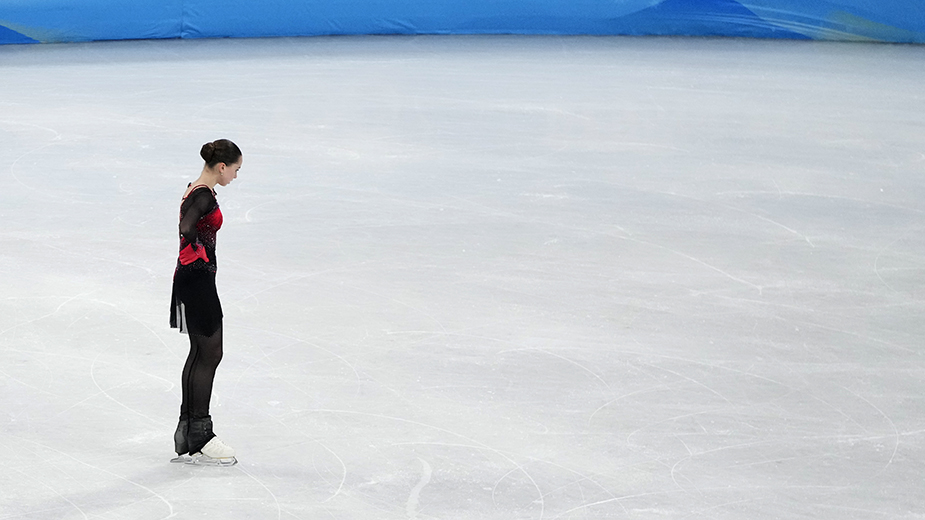Penguin Preview: Penguins Fend Off Invisible Opponent before Season Starts
The Business Journal’s annual Penguin Preview in our MidFebruary edition will have stories leading up to the start of the YSU football season. The first stories are scheduled to be published prior to the season opener against NDSU.
YOUNGSTOWN, Ohio — After a training camp much colder than any other, the Youngstown State University football team is gearing up for a season like no other.
Instead of kicking off on a warm August afternoon, the Penguins are instead getting ready for a February opener against North Dakota State on Feb. 21.
Getting to this point has required an organizational approach to ensure the team – all 100-plus players, 19 coaches and dozens of assistants – stays healthy and avoids an outbreak of COVID-19.
Ethan Solger, YSU’s assistant athletic director for sports medicine and head football athletic trainer, is keenly aware of the invisible dangers to the athletic program. The Penguins follow protocols and have instituted bubbles to avoid hiccups other fall-based programs sustained.
YSU prepared for this spring season, returning in August and practicing through the fall. Solger says he wouldn’t divulge how many positive cases the team has had since returning in August, but says student-athletes that went home over the winter break had to provide athletic training staff a negative test within three days of being back at YSU.
If there’s a positive test, Solger and the football coaches review recorded practice or game footage to see who was in contact with that person for 15 minutes or more.
Solger added those student-athletes who show symptoms receive a PCR test that takes days for a result, while healthy ones have an antigen test that has a 10- to 15-minute turnaround.
Solger says CDC guidance and the Youngstown City Health District protocol is followed when there is a positive COVID-19 test in the YSU football bubble of players, coaches and essential staff. Those who are exposed sit out for 10 days, with the timer starting either from when symptoms first show or, if they don’t have symptoms, from the day of the test.
“Throughout that 10 days we are in constant communication, seeing what symptoms they have because we’re looking for a couple red-flag signs in case we need to do cardiac screening,” Solger says.
Those who have mild symptoms do not get cardiac screening, while others who experience chest pains and shortness of breath undergo echocardiograms and then do blood work, he says.
Solger says CDC guidance changed to 10 days in quarantine if they test positive. If players test negative, they can return to the bubble on day eight.
Weight room facilities have areas where the athletes are spaced six feet apart and meeting rooms having spaced out chairs to limit the potential spread. As of late January, the first- and second-team players held meetings in person while the third-, fourth- and scout teams meet via Zoom call.
“We never have the entire squad in the building and try to keep everybody separated in pods so that if someone does test positive, we don’t have to quarantine the entire team,” he says.
How long is the reacclimation period? Solger says those in quarantine due to exposure or do not have COVID, YSU strength coaches provide workout programs athletes can do on their own such as body weight squats, biometrics, calisthenics to keep them climatized. Those who are positive don’t do any exercise for 10 days to ensure there are no underlying symptoms.
Some businesses require a negative test before returning to work, but Solger says if a student-athlete tests positive they won’t be tested again for 90 days unless they become symptomatic.
“The theory behind that is if you test positive within that 90 days, you still may have enough viral particles in your system to test positive, but you’re not actively contagious and constantly shedding,” he says.
Junior Joe Craycraft, the Penguins’ quarterback from Marion, says he and his teammates abide by the social distancing, wearing masks and things of that nature to keep as COVID-19 free as possible. YSU can practice without masks just as teams were in the pre-coronavirus era.
“At the end of the day, it’s still football,” he says.
Antonie Cook, a junior defensive end from McKeesport, Pa., maintains play is the same, but notices coming off the field is where you notice a difference when players put on their mask and socially distance in the locker room.
The only difference on the field is what’s attached to the players’ helmets. YSU director of athletics Ron Strollo says each student-athlete has a clear face shield they can attach to the face mask, which was purchased during the fall. It is less constrictive than a cloth face mask.
“It’s a little bit easier with football because they’re on the face mask so it gives a little bit of space for our student athletes to be able to breathe,” he says. “They’re not just like the mask that you and I are wearing around the office.”

Solger shows off a clear, inverted face shield, fitted inside the metallic bars of a football helmet, something YSU football players can have fitted on their apparatuses this spring. The normal visor, which goes on the top of the face mask is laser cut at the bottom to where the athletes can breathe, but covers the face to block spray from the mouth and nose.
“It’s just not the end all be all. We still encourage gaiters or face coverings, but it’s just another mitigation strategy,” he says.
YSU “kind of took the kitchen sink approach,” Solger says, to disinfecting equipment. The Penguins uses foggers in weight room facilities, where athletes are partitioned six feet apart, between groups. All equipment in the athletic training facility, are sanitized at least three times a day, if not more. Football equipment and the locker room are fogged, along with helmets and pads. There’s an ozone machine, which heats the air to a hot temperature, to disinfect footballs, basketball and other leather-based equipment.
Even in a prepandemic world, such measures weren’t unheard of, Strollo says, with disinfectant sprays and wipes being used to prevent the spread of the flu and MRSA.
“We’re kind of fortunate in athletics,” Strollo says. “That’s kind of been our world anyway before this pandemic.”
YSU head football coach Doug Phillips says he’s vehemently adhered to the protocols from medical professionals and is concentrating on coaching his first game as the Penguins coach as YSU begins the season at North Dakota State.
Those players, coaches and support staff who are being tested three times a week are the ones in the YSU football bubble, and the only ones allowed on road trips.
Phillips says social distancing will be enforced while travelling to and from the game and at the team’s hotel to protect against COVID-19, putting players who have tested positive together.
“They might be roommates together,” he says. “When we’re looking at that, [we’re] strategizing where they sit on the plane, who they sit with, who they room with. The schools that we talked to that went through this says travel was basically almost the same as it always has been except that you’re keeping that inner bubble tight and not letting anybody from outside that bubble enter.”
When the team heads to North Dakota State or other road trips, they won’t go to restaurants or have banquet-style meals as a group, Solger says. Instead, they’ll have takeout items delivered to the hotel where they go back to their rooms.
Solger says the Big Ten, Big 12, ACC, SEC and Pac-12 had few cases transmitted on a plane, providing some comfort for the Penguins heading into their spring season.
“A commercial plane right now is one of the safest places you can be,” he says. “They found out that the HVAC systems on those planes actually did well and were filtering out the air.”
Pictured: YSU head football coach Doug Phillips wears a face shield during practice.
Also in Penguin Preview:
YSU Plans for Limited Attendance at Football Games
Copyright 2024 The Business Journal, Youngstown, Ohio.



